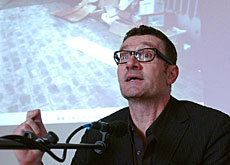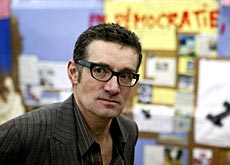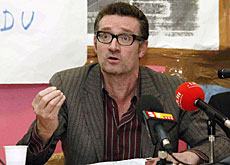“An artist has to pay the price”

Swiss artist Thomas Hirschhorn, the central figure in a controversy that led to budget cuts for the country’s arts council, blames the media for the scandal.
swissinfo met Hirschhorn before his first public appearance in Switzerland since the wrangle over his provocative Paris exhibition broke out late last year.
Entitled Swiss-Swiss Democracy, the show took aim at the Switzerland’s system of direct democracy, including an attack on the justice minister and rightwing People’s Party figurehead, Christoph Blocher.
One of the more provocative elements was a theatre piece in which someone lifts his leg to urinate on a poster of Blocher.
This single act generated headlines in the Swiss media, and led to heated debate among politicians over artistic freedom.
When the dust settled, parliament had slashed SFr1 million ($860,000) from the SFr34 million annual budget of the arts council, Pro Helvetia.
swissinfo: How do you feel about making a public appearance in Switzerland for the first time after your Paris exhibition?
Thomas Hirschhorn: I’m nervous, but that’s normal before making any speech. I’ll try to explain my own artistic logic to the audience, but I don’t know if I’ll succeed.
swissinfo: How did the public in Paris react to the Swiss-Swiss Democracy exhibition?
T.H.: The intention was not to present myself as an artist to the public, but present my work to the public. It was about being present and producing something together with the public. We managed to create something every day whether it was a newspaper, a philosophical reading or a piece of theatre.
Many people came to see the show at the Swiss Cultural Centre in Paris, and there were many different reactions. It was just nice to see that so many people came and spent time at the show or returned for a second or third visit.
I was pleased to see that it provoked debate among visitors. The Momente space I created at the centre was open to everyone – passers-by and people from the neighbourhood – not just the arts crowd. It’s proof that it’s possible to generate interest among a broader public if the show has the right form and is presented and produced properly.
swissinfo: A researcher who has studied various art scandals says everyone involved learns a lesson once the dust has settled.
T.H.: I’m not interested in theories. I prefer to concentrate on my work. There are no such things as art scandals or the Hirschhorn scandal, but a media scandal, which in turn led to a political scandal.
At first, most of the press reported in a cheap, careless and unprofessional way about this “scandalous work of art”. Then it said the exhibition was bad and artistically weak before condemning the artist for purposely staging the scandal.
No one from Blick – the Swiss newspaper with the biggest circulation, which called me the “scandal artist” – saw the exhibition. I don’t know how they can defend that.
swissinfo: Were you angry when you saw that because of the scandal, people forgot what the exhibition was all about?
T.H.: That’s the price I, as an artist, have to pay. I transformed the cultural centre. We were there, creating 11 hours a day, for two whole months.
I prepared over 1,000 newspaper pages with articles on democracy. We printed between 300 and 500 of these papers a day. The German philosopher, Marcus Steinweg, gave readings on the theme of democracy in front of 20 to 30 listeners daily.
And the play – William Tell – which we integrated into the show, was performed 50 times – always to an audience of at least 60 people. That’s why absurd journalistic assertions are so regrettable.
swissinfo: Do you think parliament’s decision to cut Pro Helvetia’s budget signals a sea change for culture in Switzerland? Will it limit artistic freedom?
T.H.: It’s never been easy for artists, but I don’t want to complain!
Since the election of Blocher to the cabinet, the Right has been on the march. Blocher, as cabinet minister, legitimises populism, extreme rightwing thinking and xenophobia. That’s the real danger, not what he can or cannot push through cabinet.
Swiss-Swiss Democracy is not an exhibition against him or any other politician. If it were, then it really would be bad art.
It is a universal work. I wanted to create a receptacle for notions of democracy using Switzerland as an example since it’s the model I know best as a Swiss citizen.
I’m not into political art, but I want my work to be political. My decision not to exhibit in Switzerland [while Blocher is in the cabinet] has nothing to do with the subject of the show. But it does explain why the exhibition was in France and not Switzerland.
swissinfo: Are you looking forward to showing your work here again when the Blocher era is over?
T.H.: I always look forward to making a new exhibition. That means I have to present my work and my artistic leanings.
It’s a challenge for me to answer the question “where do I stand, what do I want?” Be it here in Switzerland or anywhere else.
swissinfo-interview: Renat Künzi
Thomas Hirschhorn was born in Bern in 1957.
He has lived in Paris since 1984 and is considered one the most important contemporary Swiss artists.
He was awarded the Joseph Beuys prize 2004, which comes with a cheque of €30,000 (SFr45,000).
Swiss-Swiss Democracy was funded by the Swiss government.
It ran at the Swiss cultural centre in Paris until the end of January.
Pro Helvetia, the Arts Council, paid out SFr180,000 for the exhibition.
Parliament slashed SFr1 million from the Arts Council budget, cutting it to SFr33 million, after many politicians denounced the show.
The Hirschhorn exhibition, Swiss-Swiss Democracy, ended in December at the Swiss Cultural Centre in Paris.
It drew a record crowd of 30,000, three times more than preceding exhibitions.
Funded by Pro Helvetia, it made a provocative attack on the justice minister, Christoph Blocher, which led to heated debate in parliament over artistic freedom.
As a result, parliament decided to cut SFr1 million cut from Pro Helvetia’s 2005 budget.

In compliance with the JTI standards
More: SWI swissinfo.ch certified by the Journalism Trust Initiative


You can find an overview of ongoing debates with our journalists here. Please join us!
If you want to start a conversation about a topic raised in this article or want to report factual errors, email us at english@swissinfo.ch.